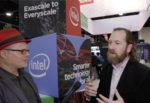In this sponsored post on behalf of Intel, we see that in today’s high-performance computing applications, many different pieces of hardware can perform data-centric functions. With diverse accelerators entering the market, programming for multiple architectures has created significant development barriers for software developers.
2nd Generation Intel® Xeon® Scalable Processors Demonstrate Amazing HPC Performance
In this guest article, our friends at Intel discuss how benchmarks show key workloads average 31% better on Intel Xeon Platinum 9282 than AMD EYPC “Rome” 7742. Intel analysis provides strong evidence that the 2nd Generation Intel Xeon Scalable Processor (Cascade Lake “CLX”) architecture provides dramatic performance for real-world workloads. An impressive array of benchmarks shows 2S systems built with Intel’s 56 core processors (Intel Xeon Platinum 9282 processor) solidly ahead of systems built with AMD’s 64 core processors (AMD EYPC 7742).
Intel Wins IO500 10-node Challenge with DAOS
In this video from SC19, Kelsey Prantis from Intel describes how the DAOS parallel file system won the IO500 10-node Challenge with Intel Optane DC persistent memory. As an all-new parallel file system, DAOS will be a key component of the the upcoming Aurora supercomputer coming to Argonne National Laboratory in 2021.
Video: Intel and Lenovo Power Cannon Supercomputer and Project Everyscale
In this video from SC19, Scott Yokel from FASRC describes Cannon, Harvard University’s first liquid-Cooled supercomputer. Developed in cooperation with Intel and Lenovo, the new system’s advanced supercomputing infrastructure will enable discoveries into areas such earthquake forecasting, predicting the spread of disease, and star formation. “With the increased compute performance and faster processing of the Cannon cluster, our researchers now have the opportunity to try something in their data experiment, fail, and try again. Allowing failure to be an option makes our researchers more competitive.”
Intel and AWS Team for HPC Performance in the Cloud
In this video from SC19, Trish Damkroger from Intel and Ian Colle from AWS describe how the two companies collaborate to deliver the best possible application performance in the Cloud. “HPC on AWS, powered by Intel Xeon Scalable processors, offers the most elastic, scalable cloud infrastructure to run HPC applications, and the range of services makes it easier than ever to get started quickly, securely, and cost-effectively.”
Lenovo and Intel to Bring High-End HPC Capabilities to more users with Project Everyscale
In this video, Trish Damkroger from Intel and Scott Tease from Lenovo describe their collaboration on Project Everyscale. “With Project Everyscale, our goal is to democratize exascale technologies and bring leading Xeon scalable processors, accelerators, storage, fabrics, software and more to HPC customers of every scale or any workload.”
Optimizing in a Heterogeneous World is (Algorithms x Devices)
In this guest article, our friends at Intel discuss how CPUs prove better for some important Deep Learning. Here’s why, and keep your GPUs handy! Heterogeneous computing ushers in a world where we must consider permutations of algorithms and devices to find the best platform solution. No single device will win all the time, so we need to constantly assess our choices and assumptions.
Heterogeneous Computing: Long Live the CPU
In this guest article, our friends at Intel discuss how the company is investing in heterogeneous computing. Intel recently spoke about supporting heterogeneous computing with the catch phrase “One Size Does Not Fit All” in talking about software and Intel’s commitment to help programmers with oneAPI.
HPC in the Cloud Offers Flexible, Scalable Solutions for Enterprises and Research Institutions
In this guest article, our friends at Intel discuss how HPC as a Service (HPCaaS) reduces barriers to HPC and offers a cost-effective extension to on-premise solutions. High performance data analytics (HPDA), simulation and modeling, and artificial intelligence (AI) enable significant benefits like quicker business insights, the ability to design and bring products to market faster, or real-time monitoring of financial transactions for fraud.










